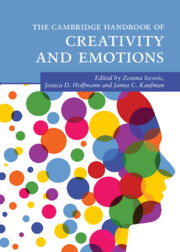Book contents
- The Cambridge Handbook of Creativity and Emotions
- Cambridge Handbooks in Psychology
- The Cambridge Handbook of Creativity and Emotions
- Copyright page
- Dedications
- Contents
- Figures
- Tables
- Contributors
- Acknowledgments
- Creativity and Emotions
- Part I Methods in the Study of Creativity and Emotions
- Part II The Development of Creativity
- 5 Affective States and Creativity
- 6 The Neuroscience of Creativity and Emotions
- 7 Attention, Affect, and Creativity, from Mindfulness to Mind-Wandering
- 8 Motivations, Emotions, and Creativity
- 9 Managing Difference and Uncertainty and Creativity
- 10 Creativity and Emotional Intelligence
- 11 Emotions across the Creative Process and across Domains of Creativity
- Part III Emotions and the Creative Person
- Part IV Emotions and Creative Products
- Part V Emotions and Creativity at School and Work
- Index
- References
8 - Motivations, Emotions, and Creativity
from Part II - The Development of Creativity
Published online by Cambridge University Press: 16 February 2023
- The Cambridge Handbook of Creativity and Emotions
- Cambridge Handbooks in Psychology
- The Cambridge Handbook of Creativity and Emotions
- Copyright page
- Dedications
- Contents
- Figures
- Tables
- Contributors
- Acknowledgments
- Creativity and Emotions
- Part I Methods in the Study of Creativity and Emotions
- Part II The Development of Creativity
- 5 Affective States and Creativity
- 6 The Neuroscience of Creativity and Emotions
- 7 Attention, Affect, and Creativity, from Mindfulness to Mind-Wandering
- 8 Motivations, Emotions, and Creativity
- 9 Managing Difference and Uncertainty and Creativity
- 10 Creativity and Emotional Intelligence
- 11 Emotions across the Creative Process and across Domains of Creativity
- Part III Emotions and the Creative Person
- Part IV Emotions and Creative Products
- Part V Emotions and Creativity at School and Work
- Index
- References
Summary
Research has shown that motivation plays an important role in guiding the creative process – why a person creates likely influences how they do so. This chapter summarizes existing evidence regarding motivational factors affecting the creative process and its outcomes. In doing so, this chapter also discusses existing research describing the interplay between motivations and emotions that precede, accompany, or result from the creative process for creators and audience members. To date, a large body of research has demonstrated that intrinsic motivation and associated positive affect predict greater creativity; creative individuals for example report enjoying their work because it satisfies their intellectual curiosity, or simply because the process of creation itself is pleasurable. Related, creative individuals may be driven by the desire to address emotional difficulties, though little research to date has examined this question using a motivational lens. Finally, recent research suggests that extrinsic motivations may also benefit the creative process under certain conditions. Creative individuals may often be motivated by the desire to meaningfully contribute to the lives of others. Accordingly, recent research has shown that prosocial motivation may increase creativity by enhancing the ability to consider the viewpoints of possible beneficiaries of one’s work.
- Type
- Chapter
- Information
- The Cambridge Handbook of Creativity and Emotions , pp. 149 - 166Publisher: Cambridge University PressPrint publication year: 2023

